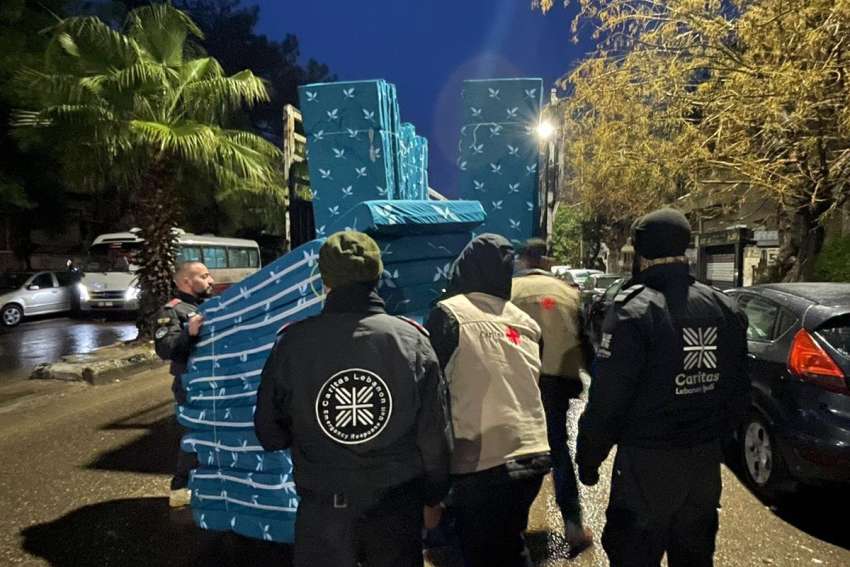NEW YORK -- Catholic aid agencies are working alongside other international humanitarian organizations to house, feed and administer additional life-saving assistance to tens of thousands of people in Syria and Turkey.
Devastating earthquakes and tremors that ravaged those two countries in February have killed at least 50,000 people, wounded many more and displaced millions of others, according to the United Nations, which is leading some of the recovery efforts and has made repeated appeals for millions of more dollars in aid to help meet increasingly massive recovery needs.
In Syria, where people were already suffering the effects of ongoing civil war, the post-quake situation is particularly dire, according to Catholic aid groups doing work there.
"We are looking at a population that has been devastated by 12 years of civil war, as well as folks who have been devastated by Western, U.S.-led sanctions and internal corruption," said Michael La Civita, head of communications for Catholic Near East Welfare Association (CNEWA).
A month following the initial 7.8 magnitude earthquake of Feb. 6, CNEWA was still in the first phase of its recovery efforts in Syria. Significant quakes and aftershocks, combined with years of war hardships, have created a "quite unstable" situation, La Civita told OSV News.
Through a network of Syria-based Catholic churches, CNEWA is now feeding and sheltering about 4,600 people in four areas of the country that had suffered the most damage, said La Civita.
"We are focusing on immediate relief such as the provision of food supplies, medicines, blankets, clothes, mattresses, things of that nature," he said.
Another Catholic relief organization doing work in Syria told OSV News that it planned to ultimately reach about 40,000 people in need, via its food and shelter programs now underway, which included an imperative psychosocial component.
Speaking by phone from Aleppo -- one of Syria's most severely devastated regions -- Jesuit Father Tony O'Riordan, the Syria director for Jesuit Refugee Service, told OSV News that in addition to destroying buildings and homes, the earthquakes had "shattered" the ability among many to cope, and that there was now "a deep need for a psychological and a spiritual response as well as material, and both must go hand in hand."
"We have been organizing people to come to group sessions, to share their story," he said. "So it is accompanying people through storytelling. And for some people, we are offering one to one sessions where they have major doubts about their sense of insecurity: 'Is this normal?' or 'How do I deal with my children who are not sleeping? Who are involuntarily urinating at night time? Who won't sleep in the house?' So we intervene at this level at the same time as (we provide) the shelter need," he said.
In neighboring Turkey, tens of thousands of people are in equally desperate need of aid, both material and emotional, said a member of another Catholic charity group, Caritas Turkey.
"We can't help everybody; obviously we try to use our vulnerability selection," said Giulia Longo, Caritas Turkey program manager, whose office and home in Anatolia "totally collapsed" during the initial earthquake. By some "miracle," she said, "nobody got injured or ... dead."
"The approach that we are choosing ... is to help the most discriminated or the ones that are out of the system," Longo told OSV News in a March 3 phone interview. "So widows, women with particular vulnerabilities, children that are not enrolled in school for different reasons, disabled or old persons that are forgotten by the system and especially remote villages that maybe at the moment they are not receiving all the services."
She said Caritas was distributing food, clothing, blankets, hygiene packages and some psychosocial services to approximately 2,600 of the most vulnerable people, including refugees, in some of the hardest hit and remote areas of Turkey, through the combined work of local and international Caritas staff and volunteers.
But Longo also noted that because of the earthquakes, everyone, even some Caritas staff members, had "big trauma."
"It is very difficult to come back to a calm situation to start to rebuild life or to start to try to forget what happened in a constructive way," she said.


